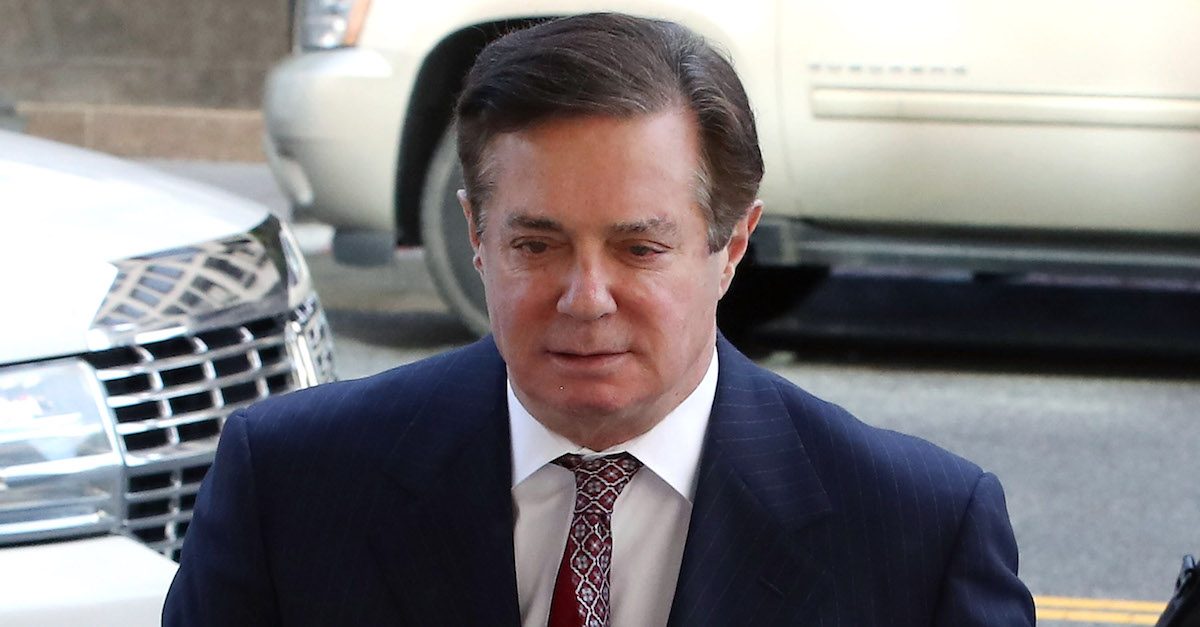
Paul Manafort’s attorneys took heavily to rhetoric when they made their closing arguments in the case against their client on charges of bank fraud and tax evasion in the Eastern District of Virginia on Wednesday afternoon.
Opting for a tag-team effort, attorney Richard Westling would address the bank fraud charges while Kevin Downing spoke largely about Rick Gates.
Westling’s arguments began with a lengthy lecture to the jury about their duty as components of democracy and justice. Such lectures are typical and Assistant U.S. Attorney (AUSA) Greg Andres made similar remarks about juror responsibility—but the defense took about three times as long to make this point.
Mr. Westling then launched into a somewhat academic and jurisprudential argument about reasonable doubt, telling the jury, “If you’re thinking right now that all of this evidence adds up to something—take that out of your mind.”
Next came a character reminder. Paul Manafort, Westling reminded everyone, had worked on numerous Republican presidential campaigns—including George H.W. Bush and Bob Dole—leading up to then-candidate Donald Trump’s. Westling noted:
This is a man who has been involved in American politics for most of my lifetime and he has endeavored to serve.
Getting to the heart of the matter, Westling essentially offered the notion that Manafort was too sloppy to have been intentionally covering up crimes. He said, Return of the idiot defense from Westling: “Paul Manafort involved his bookkeeper, his accountant and others…that is not consistent with fraud. Fraud is about secrecy.”
Directly addressing the prosecution’s arguments, Westling cast the narrative thusly. The government claims Paul Manafort (1) didn’t have money; and (2) needed money for his lifestyle. “That’s not true,” Westling implored.
To support this argument, Manafort’s attorney said, Westling also said Manafort was too wealthy to commit crimes. “He had $8.6 million at the end of 2016…why does the government come and try to put witnesses on to say he doesn’t have money?”
When it came time to address government evidence, Westling argued that there were lots of confusing terms and issues involved. This confusion, Westling claimed, was reflected in various email threads about attempting to secure loans on various properties owned by Manafort. The timelines were messy and admitted that mistakes may have been made, but there simply wasn’t intent to conspire to defraud banks, Westling argued.
Regarding an allegedly misrepresented mortgage on one such property, Westling said it was a simple mix-up and that Manafort eventually cleared it up. Westling rushed through this and then demanded, “Where’s the fraud?”
“They’ve done a good job of selectively pulling…information together, but it is a selection,” Westling said, attempting to cast the government’s case against his client as a cobbled-together railroading and affront to justice.
Sticking with the concept of confusion, Westling also made an argument that the special counsel’s office attempted to overcharge Manafort in an attempt to overwhelm the jury with charges. Curiously, no objections were raised at the time this argument was made.
This extended narrative of untoward confusion later prompted AUSA Greg Andres to request a curative instruction telling the jury they could not consider the Department of Justice’s motive—or lack thereof—in bringing charges against Manafort. After some discussion, this motion was granted by Judge T.S. Ellis III.
Later on, Westling focused his ire on the government’s witnesses—called and uncalled. The bankers called, Westling argued, were just assistants and not really in a position to know what the banks they worked for thought about anything having to do with Manafort’s loans and loan applications. “They didn’t make decisions,” he said.
Westling then noted that many witnesses were not called—chief among them loan manager David Fallarino and bank CEO Stephen Calk. Westling scowled, “Determine what that means.”
At another point, when discussing the alleged misrepresentation of a Manafort rental property in Manhattan as a second home on a loan application, Westling made an argument which called to mind his earlier subtext about selective prosecution. He said:
If this were a fraud, we’d have courts in this country full of bank fraud.
That’s quite an argument, but probably not one you want to be making at the tail end of a trial.
[Image via Mark Wilson/Getty Images]